Moroccan music varies greatly between geographic regions and social groups. It is influenced by musical styles including Arab, Berber, Andalusi, Mediterranean, Saharan, West African, and others.
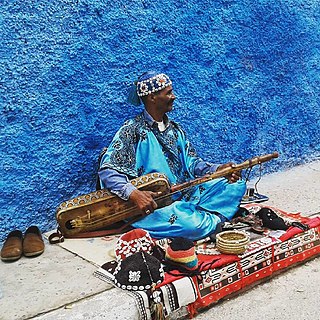
The Gnawa are an ethnic group inhabiting Morocco, that had been brought as slaves from West African Sahel, especially northern Nigeria.

Mahmoud Guinia was a Moroccan Gnawa musician, singer and guembri player, who was traditionally regarded as a Maâllem, i.e. master. The family name is Gania, which also was the spelling in the passport of the artist.
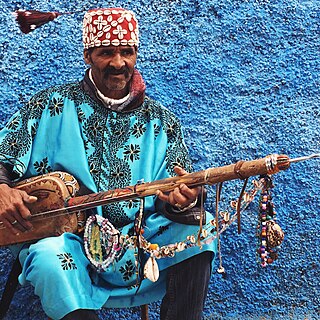
Gnawa music is a body of Moroccan religious songs and rhythms. Its well-preserved heritage combines ritual poetry with traditional music and dancing. The music is performed at lila, communal nights of celebration dedicated to prayer and healing guided by the Gnawa maalem, or master musician, and their group of musicians and dancers. Though many of the influences that formed this music can be traced to West African kingdoms, its traditional practice is concentrated in Morocco. Gnawa music has spread to many other countries in Africa and Europe, such as France.
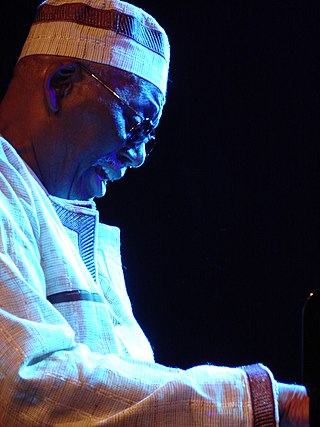
Randolph Edward "Randy" Weston was an American jazz pianist and composer whose creativity was inspired by his ancestral African connection.
Jil Jilala is a Moroccan musical group which rose to prominence in the 1970s among the movement created by Nass El Ghiwane and Lem Chaheb. Jil Jilala was founded in Marrakech in 1972 by performing arts students Mohamed Derhem, Moulay Tahar Asbahani, Sakina Safadi, Mahmoud Essaadi, Hamid Zoughi and Moulay Abdelaziz Tahiri. In 1974, they released their first record Lyam Tnadi on the Atlassiphone label. The songs "Leklam Lemrassaa," "Baba Maktoubi," "Ha L'ar a Bouya," "ah ya Jilala" and "Chamaa" quickly achieved the status of popular 'classics.'
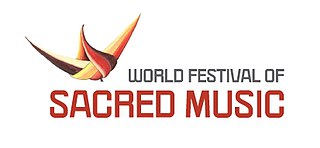
The Fez Festival of World Sacred Music is an annual music festival that is held for a week in Fez, Morocco. It was first held in 1994 and usually held over 10 days in early June. The festival includes concerts, debates, and joint performances of Muslim and Christian devotional music from artists from all over the world.

Raymond Lema A'nsi Nzinga, known as Ray Lema, is a Congolese (DRC) musician. A pianist, guitarist, and songwriter, he settled in France in 1982.

Hoba Hoba Spirit is a musical fusion band based in Casablanca, Morocco that was formed in 1998. It is composed of Adil Hanine (drummer), Anouar Zehouani (guitarist), Saâd Bouidi, Reda Allali - and Othmane Hmimar(percussionist). The name of the group is based on a song by Bob Marley.

Hassan Hakmoun is a Moroccan musician who specializes in the Gnawa style.
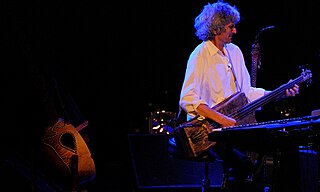
Loy Ehrlich is a French musician, composer and producer based in Paris.

Oudaden is a Moroccan musical group that plays Berber amazigh music. The band was formed in 1978 in Ben Sergao, near Agadir, in the Sous region of Morocco. Its lead vocalist and banjoist is Abdellah el Foua.
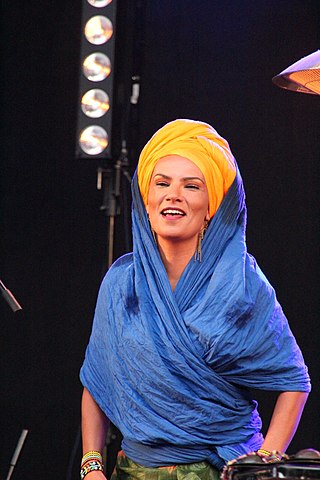
Oum El Ghaït Benessahraoui, better known as Oum, is a singer-songwriter of modern Moroccan popular music. Performing and recording both in North Africa and in Europe, she mixes hassani, jazz, gospel, soul, afrobeat and Sufi musical influences in her songs.
Fatoumata Koné, is a Malian composer and singer. She sings in the Bamana language.
Habib Belkziz is a Moroccan gnawa singer, audio engineer, music producer, songwriter, and multi-instrumentalist. He released the Album Sidi Kmmy produced by HaBiBelk Productions Records.

Hamid El Kasri is a Moroccan Gnawa musician traditionally considered a maâlem, or "master musician". Born in Ksar El Kebir, Morocco, he now lives in Rabat. His last name is an artist name simply meaning "from Ksar El Kebir". He began training at age seven, taught by the Tangier Maâlem Abdelouahed Stitou and Maâlem Alouane initially in the special Chemeli or Northern style of Gnawa music, which is distinctly different from the usual styles of Marrakech. El Kasri is famed for his deep, intense voice, which has made him one of the most sought-after maâlems, both in Morocco and abroad. In addition to singing, he performs on the guembri (الكمبري), a three-stringed bass instrument. He is noted for having blended the Gnawa rhythms of the north and south of the Morocco.

Asma El Hamzaoui is a Moroccan gnawa singer and musician. She is known to be Morocco's first female gnawa musician, a genre that is traditionally reserved for male artists.

Majid Bekkas, also known as Abdelmajid Bekkas, is a Moroccan musician on guembri, oud, guitar and vocals, who is internationally known for his contributions to World music and Ethno jazz with North African roots.

Bab L' Bluz is a Moroccan-French rock band that was formed in Marrakesh in 2018. The band consists of lead vocalist/ electric awisha Yousra Mansour, electric gimbri player and multi-instrumentalist Brice Bottin. As an exponent of the "Nayda" artistic movement in Morocco which places emphasis on local heritage, Mansour provides vocals in the Moroccan Arabic dialect of Darija. Bab L' Bluz take inspiration from a wide range of musical styles such as Gnawa music, blues, Chaâbi, and Afrobeat.

Moga Festival is an electronic music festival held annually in Essaouira, Morocco, inspired by the decorations of the series Game of Thrones.
















